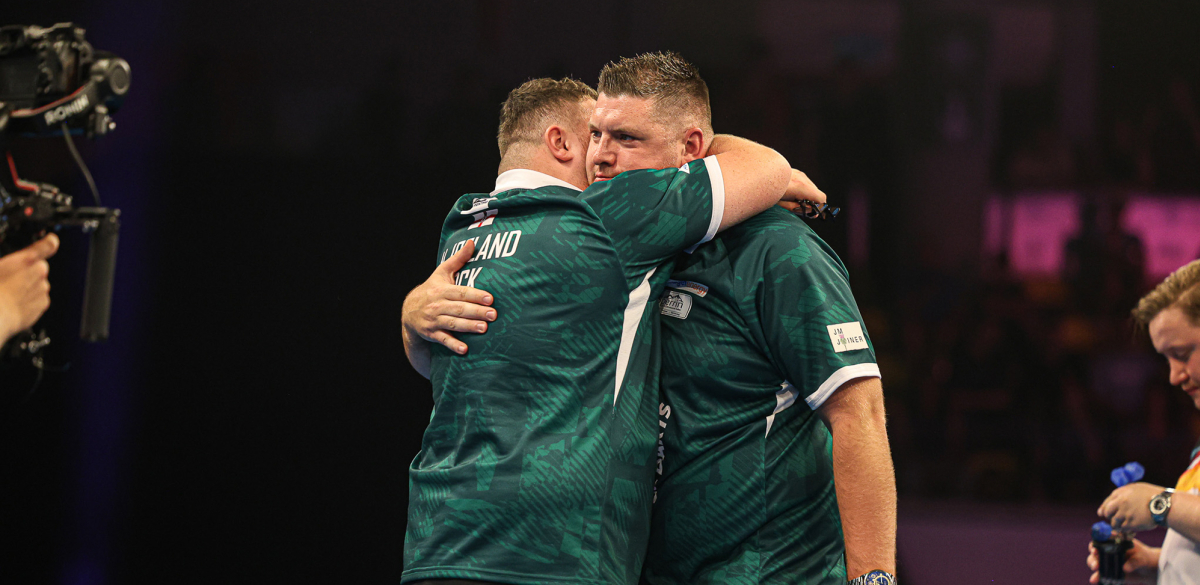
In his latest column, PDC Stats Analyst Christopher Kempf analyses the key numbers behind Northern Ireland's BetVictor World Cup of Darts triumph in Frankfurt last weekend.
A tournament average of 81 would not typically be sufficient to win any title in the PDC, let alone a televised title also contested by the best players in the world.
Three scores of 180 and six of 140 across a weekend are figures dwarfed by Luke Littler in single matches, let alone a victorious tournament campaign.
Yet Daryl Gurney, whose statistics as an individual in the World Cup can be summarised, and whose teammate contributed more than 4,000 additional points to the Northern Irish team effort than he - made an equally important contribution to his national team in spite of his 81 average.
The doubles-only World Cup format has made both members of a team equally responsible for its success.
No more can teams secure victory by only winning singles matches: this has put to an end awkward circumstances such as those surrounding the last champion under the old tournament structure - Team Australia, who actually lost their doubles match to Wales in the 2022 final but won the title.
Abolished also are individual matches in the later stages of the tournament in best-of-seven legs, the shortest format of any PDC event. Individual matches could be concluded in as few as eight minutes before: the 2025 final was a 19-leg slugfest which took the better part of an hour to produce a winner.
These changes have put the tournament's emphasis on group cohesion and teamwork over long format matches, with the result of making the World Cup a truly unique event in PDC darts.
Because the player throwing first in doubles matches rarely is in a position to set up a double in his team's third visit to the board in a leg, the lead player carries more of the scoring burden.
While many teams select their most experienced player to throw in odd-numbered visits, Northern Ireland reaped dividends from having Josh Rock, one of the PDC's leading 180-hitters, assume this role.
After his first visit, Rock left a score less than 401 for his teammate in a majority of their 51 legs, and began the leg without a treble less than 20% of the time.
'Rocky' also hit at least two trebles in half of his second visits (third for the team), leaving his teammate to subsequently attempt 20 finishes in 51 legs.
Throughout the tournament, their rivals Wales only managed 19 attempts in 54 legs, despite a slightly higher team average. Without Josh Rock's contribution of a 99 average, Northern Ireland may have fallen in the quarter-finals to their rivals from the other side of the British-Irish border.
The effectiveness of Rock's set-ups allowed Daryl Gurney to take over the 'closer' role for his team, and he did so to great effect.
Gurney attempted four ton-plus checkouts on which the opposing team was waiting on a score of less than 100 and completed two of them, including a 130 finish to set the tone for the final in the opening leg.
But more importantly, Gurney attempted 22 finishes of less than 60. Even in successfully completing these in the fewest possible darts, they would detract from his average - such is the difficulty of measuring the performance of the player throwing second in doubles matches.
Thus Gurney's eventual 81 average belies the fact that the 2017 World Grand Prix champion completed 17 of these (77%) - a world-class conversion rate. Gurney finished enough of these small checkouts to win two matches all by himself, and still have one leg left over.
Gurney admittedly had difficulty hitting trebles throughout the World Cup: only 36% of his visits to the board resulted in a score of 100 or more.
Yet while he threw only three 180s in the entire tournament, they were timed so perfectly to provide the maximum impact in his matches that Gurney's experience on TV is a better explanation for these masterstrokes than pure luck or coincidence.
Northern Ireland trailed in five of their 51 legs in the tournament, and two of Gurney's maxima came when his team was facing the most adversity: at 4-5 down in both the final and quarter-final, and following rare barren visits from Rock, 'Superchin's trebles allowed his teammate to recover and level the match.
His third came in the deciding leg of the tournament, won on throw in 11 darts, which made it impossible for Wales, despite a Price maximum, to carry the men from Ulster to World Cup of Darts glory.
Most World Cup champion teams have been comprised of past or future World Champions with the ability to threaten world records and go for the elusive doubles nine-darter: this was certainly not the case for the Northern Irish team this past weekend.
However, rarely have fans seen a team take full advantage of the format and its members adopt specific roles in their campaign for the title.
Rock pounded the trebles and Gurney cleaned up on the doubles. Teams composed of a young prodigy and a veteran champion have always been present in the World Cup, but this year a team made the most of their relative strengths and weaknesses to bring home the gold for their country.
Follow Christopher on Twitter @ochepedia